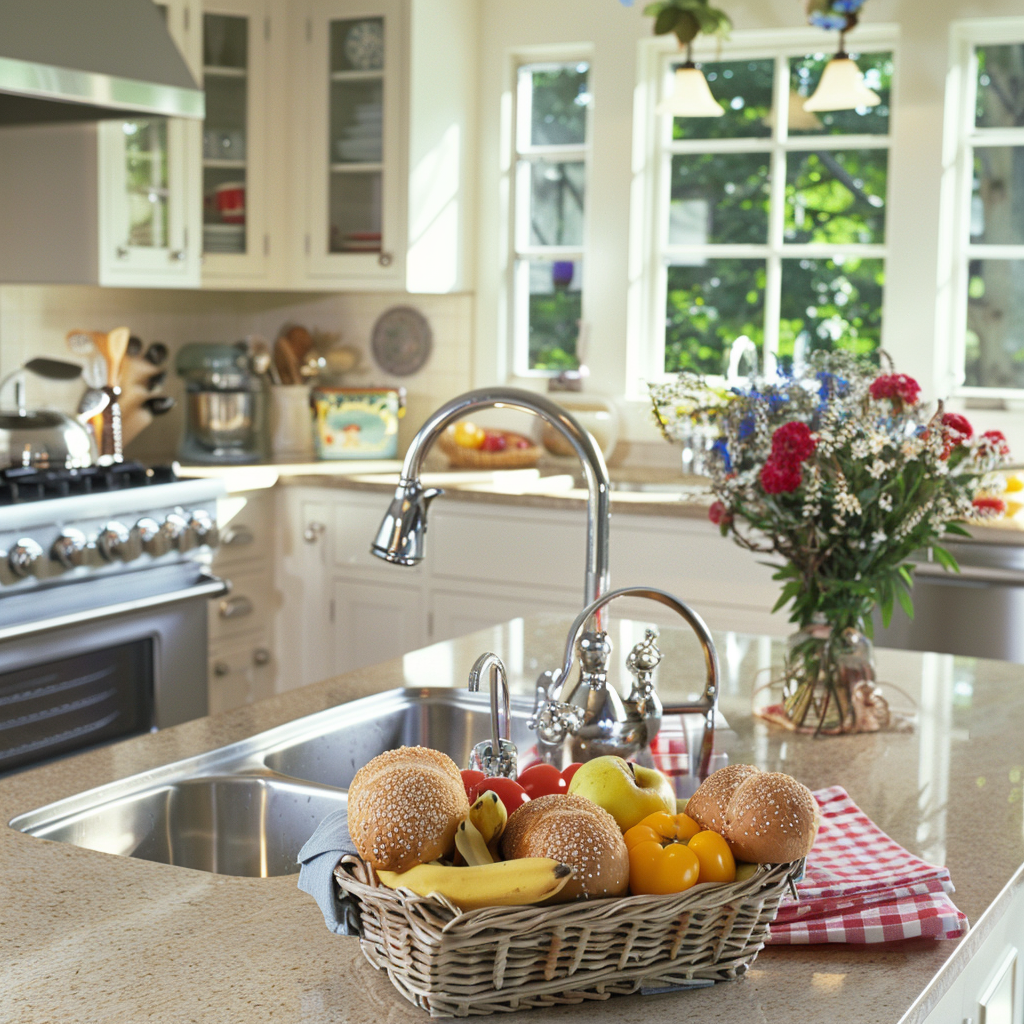Eco-Friendly Kitchen Cleaning Hacks: Grandma's Natural Tips for a Spotless Home

Share
Grandma's Secrets: Eco-Friendly Cleaning Hacks for a Sparkling Kitchen
Keeping your kitchen clean and inviting is a breeze with Grandma's tried-and-true methods. Embrace these eco-friendly tips to maintain a spotless kitchen using natural ingredients. Not only are these methods safe and healthy, but they also save you money and reduce environmental impact.
The Power of Baking Soda and Vinegar
Baking soda and vinegar are your kitchen's best friends. Their natural cleaning power is unmatched, tackling grease, grime, and odors with ease.
Step-by-Step Guide to Cleaning Your Stovetop:
Gather Supplies: Baking soda, white vinegar, a spray bottle, a scrub brush, and microfiber cloths.
Initial Clean: Remove grates and burners. Spray the stovetop with vinegar and let it sit for 5 minutes.
Personal Tip: Letting the vinegar sit for a few extra minutes on tough spots can help break down stubborn grime more effectively.
Scrub Away Grease: Sprinkle baking soda over the surface, then scrub with a damp brush.
Personal Tip: For extra stubborn spots, apply a bit more baking soda directly to the brush for added scrubbing power.
Rinse and Wipe: Spray with vinegar again, wipe clean with a microfiber cloth, and replace the grates and burners.
Personal Tip: Using a microfiber cloth helps avoid streaks and leaves your stovetop with a nice shine.
Keeping Your Refrigerator Fresh
A clean fridge is essential for food safety and freshness. Follow these simple steps to ensure your fridge stays odor-free and hygienic.
Empty and Sort: Remove all items, check expiration dates, and discard old food.
Personal Tip: Use this time to plan meals around items that are close to their expiration date to reduce waste.
Clean Shelves and Drawers: Wash with a mixture of warm water and baking soda.
Personal Tip: Adding a few drops of essential oil to the cleaning mixture can leave a pleasant scent behind.
Deodorize: Place an open box of baking soda in the back to absorb odors.
Personal Tip: Replace the baking soda every three months for optimal freshness.
Organize: Use clear bins and labels to keep items easily accessible and organized.
Personal Tip: Keeping similar items together (like condiments or snacks) can make it easier to find what you need quickly.
Grandma’s Tips for a Pristine Sink
The kitchen sink sees a lot of action and can quickly become a hotspot for germs. Grandma’s method keeps it shining.
Rinse and Sprinkle: After each use, rinse the sink and sprinkle baking soda over the surface.
Personal Tip: For an even deeper clean, mix baking soda with a little water to form a paste and let it sit for a few minutes before scrubbing.
Scrub and Shine: Scrub with a brush, then rinse. For extra shine, wipe with a cloth dipped in vinegar.
Personal Tip: Finish off by rubbing a few drops of olive oil onto stainless steel sinks for a long-lasting shine.
Drain Maintenance: Pour a mix of baking soda and vinegar down the drain weekly to prevent clogs and odors.
Personal Tip: Follow up with boiling water to ensure everything is flushed through the pipes.
Eco-Friendly Cleaning Solutions for Every Part of Your Kitchen
Countertops:
Granite and Marble: Use a mixture of water and mild dish soap. Avoid acidic substances like vinegar and lemon, which can damage the stone.
Personal Tip: Buff the countertops with a dry cloth after cleaning to bring out their natural shine.
Laminate and Wood: Clean with a mixture of vinegar and water. For wood, follow up with a light application of olive oil to condition the surface.
Personal Tip: Test a small area first to ensure the vinegar solution doesn’t dull the finish on wooden surfaces.
Floors:
Tile Floors: Mix 1/2 cup of vinegar with a gallon of water. Mop as usual and let it air dry.
Personal Tip: For extra tough grime on tile, use a scrub brush with the vinegar solution for spot cleaning.
Wood Floors: Use a mix of vinegar and water, but be careful not to oversaturate the wood. Dry thoroughly with a microfiber cloth.
Personal Tip: Adding a few drops of essential oil to the mix can give your floors a pleasant, lingering scent.
Appliances:
Microwave: Place a bowl of water with lemon slices inside and microwave for 5 minutes. The steam loosens grime, making it easy to wipe away.
Personal Tip: Use the heated lemon slices to wipe down the inside of the microwave after steaming for an added boost of freshness.
Oven: Create a paste with baking soda and water. Spread it inside the oven and let it sit overnight. Wipe clean with vinegar the next day.
Personal Tip: Use a plastic spatula to gently scrape off any remaining residue for a thorough clean.
The Benefits of Eco-Friendly Cleaning
Healthier Home Environment: Natural cleaners reduce the risk of chemical exposure, making your home safer for you and your family.
Environmental Impact: Eco-friendly products are biodegradable and reduce the pollution of waterways and ecosystems.
Cost-Effective: Common household items like vinegar and baking soda are inexpensive and versatile, saving you money on specialized cleaning products.
Maintaining a clean kitchen with these eco-friendly tips ensures a safe and pleasant cooking environment. Grandma’s wisdom, paired with natural ingredients, keeps your kitchen sparkling without harsh chemicals. Embrace these practices and enjoy a healthier home for you and your family.


